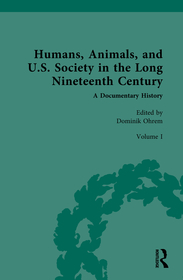
Humans, Animals, and U.S. Society in the Long Nineteenth Century: A Documentary History
Volume I: Animal and Human in American Thought (Part 1)
- Publisher's listprice GBP 110.00
-
52 552 Ft (50 050 Ft + 5% VAT)
The price is estimated because at the time of ordering we do not know what conversion rates will apply to HUF / product currency when the book arrives. In case HUF is weaker, the price increases slightly, in case HUF is stronger, the price goes lower slightly.
- Discount 10% (cc. 5 255 Ft off)
- Discounted price 47 297 Ft (45 045 Ft + 5% VAT)
Subcribe now and take benefit of a favourable price.
Subscribe
52 552 Ft

Availability
Not yet published.
Why don't you give exact delivery time?
Delivery time is estimated on our previous experiences. We give estimations only, because we order from outside Hungary, and the delivery time mainly depends on how quickly the publisher supplies the book. Faster or slower deliveries both happen, but we do our best to supply as quickly as possible.
Product details:
- Edition number 1
- Publisher Routledge
- Date of Publication 18 November 2025
- ISBN 9780367470005
- Binding Hardback
- No. of pages234 pages
- Size 234x156 mm
- Weight 453 g
- Language English
- Illustrations 16 Halftones, black & white 700
Categories
Short description:
Volume I traces the significance of animals, and the "problem" of animality, within the currents of U.S. social and scientific thought during a period marked by a rapid expansion of American and transatlantic print culture.
MoreLong description:
Volume I traces the significance of animals, and the "problem" of animality, within the currents of U.S. social and scientific thought during a period marked by a rapid expansion of American and transatlantic print culture. It provides insights into how evolving ideas about animal intelligence, sociality, morality, and language interacted with contemporary notions of human nature in ways that could be mobilised both to defend and to challenge traditional claims to human uniqueness and rigid distinctions between human and animal life.
MoreTable of Contents:
Volume 1: Animal and Human in American Thought (Part 1)
General Introduction
Volume 1 Introduction
1. William Bartram, “Anecdotes of an American Crow”, Philadelphia Medical and Physical Journal 1 (1804): 89–95.
2. Frederick Augustus Rauch, extract from Psychology; or, a View of the Human Soul; Including Anthropology (New York: M. W. Dodd, 1841), pp. 9-17, 30-44.
3. Phrenology and Animal “Character” in the American Phrenological Journal (1845-1851)
3.1 [Orson Fowler], “The Physiology, Phrenology, and Natural History, of the Ourang Outang, or Chimpanze.” American Phrenological Journal 7, no. 3 (March 1845): 65-70.
3.2 “Animal Phrenology.” American Phrenological Journal 13, no. 1 (January 1851): 6-7.
3.3 “Animal Phrenology. Number II.” American Phrenological Journal 13, no. 2 (February 1851): 32.
4. Lewis Henry Morgan, “Animal Psyhology”, in The American Beaver and His Works (Philadelphia: J. B. Lippincott and Co., 1868).
5. Arthur E. Brown, [Primate Minds and Morals in the Philadelphia Zoo], The American Naturalist (1878-1883)
5. 1 Arthur Erwin Brown. “The Serpent and the Ape.” The American Naturalist 12, no. 4 (April 1878): 225–28.
5.2 ––––, “Grief in the Chimpanzee.” The American Naturalist 13, no. 3 (March 1879): 173–75.
5.3 ––––, “The Kindred of Man.” The American Naturalist 17, no. 2 (February 1883): 119–30.
6. Francis Bowen, “The Human and the Brute Mind”, The Princeton Review 56 (May 1880): 321–29, 331-34, 336-38, 340-43.
7. William James, “What Is an Instinct?” Scribner’s Magazine 1, no. 3 (March 1887): 355–65.
8. Richard Lynch Garner, [Learning the Simian Tongue], from The Speech of Monkeys” (New York: Charles L. Webster & Co., 1892), pp. 3-21, 30-9, 57-67
9. Edward Lee Thorndike, “Do Animals Reason?” Popular Science Monthly 55 (August 1899): 480–490, and “Correspondence: ‘Do Animals Reason?’” Popular Science Monthly 55 (October 1899): 843–847.
10. Ernest Ingersoll, “Do Animals Commit Suicide? A Study of Brute Limitations’, in The Wit of the Wild. (New York: Dodd, Mead and Company, 1906), pp. 196-210.
11. William Temple Hornaday, [Animal Crime and Criminal Animals], “The Psychology of Wild Animals”, McClure’s Magazine 30, no. 4 (February 1908): 469–79.
12. Margaret Floy Washburn, [Mathods and Challenges in Studying Animal Minds], from The Animal Mind: A Text-Book of Comparative Psychology (New York: The Macmillan Company, 1908), pp. 1-5, 7-13, 24-36.
13. Charles Abram Ellwood, “The Origin of Society.” American Journal of Sociology 15, no. 3 (November 1909): 394-404.
14. Ira Woods Howerth, “The Great War and the Instinct of the Herd”, International Journal of Ethics 29, no. 2 (1919): 174–87.
Index
More



